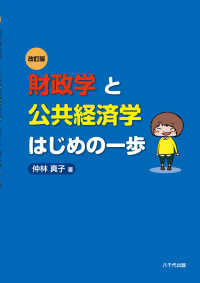Full Description
A 2023 Choice Reviews Outstanding Academic Title
Assuming no background knowledge of philosophy, John Ryder's introductory text surveys canonical writings and contemporary applications to inform future teachers' practice of systematic philosophy of education. Exposing readers to the philosophies that built Western education, the book welcomes the development of alternate approaches through systematic analysis of how theory informs practice.
The book systematically analyzes key contributions by the four most influential figures in the philosophy of Western education—Plato, Jean-Jacques Rousseau, John Dewey, and Paolo Freire.
The book then builds on historical theories to help readers develop their own systematic philosophies of education. After questions of why, how, by or for whom, about what, where, and when education should be undertaken, the book delves into metaphysical, epistemological, and socio-political questions that may underlie educational principles.
Encouraging readers to practice a philosophy of education rather than follow a prescribed path, the book presents a model of exploration that builds on ideas developed by philosophers such as Nel Noddings that can be applied across contemporary and emerging educational issues. The analytic experience and conceptual background material of this book enables readers to think carefully and reflectively about educational principles, policies, and practices as they dedicate themselves to the profession of education.
Contents
Introduction
Part I
Chapter 1: Reality, the Good, and the State: Plato's Republic
Chapter 2: Nature and the Individual: Rousseau's Emile
Chapter 3: Experience and Democracy: Dewey's Democracy and Education
Chapter 4: Domination and Liberation: Freire's Pedagogy of the Oppressed
Part II
Chapter 5: Education and Its Problems
Chapter 6: Education in Context: Nature, Knowledge, and Experience
Chapter 7: Education in Context: Society and the State
Conclusion
Notes
Biographical Sketches







